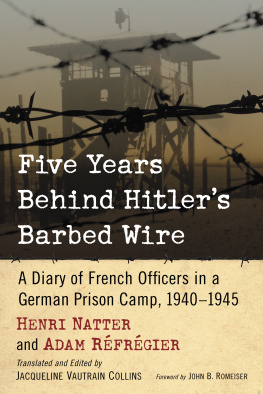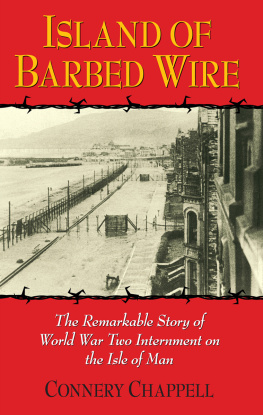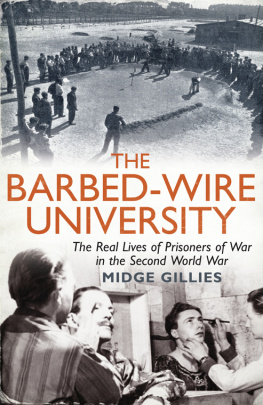Five Years Behind Hitlers Barbed Wire
A Diary of French Officers in a German Prison Camp, 19401945
Henri Natter and Adam Rfrgier
Translated and Edited by Jacqueline Vautrain Collins
Foreword by John B. Romeiser

McFarland & Company, Inc., Publishers
Jefferson, North Carolina
LIBRARY OF CONGRESS CATALOGUING DATA ARE AVAILABLE
e-ISBN: 978-1-4766-2220-0
BRITISH LIBRARY CATALOGUING DATA ARE AVAILABLE
2015 Jacqueline Vautrain Collins. All rights reserved
No part of this book may be reproduced or transmitted in any form or by any means, electronic or mechanical, including photocopying or recording, or by any information storage and retrieval system, without permission in writing from the publisher.
On the cover: Watchtower of German prison camp (photograph by Bruno Lutz)
McFarland & Company, Inc., Publishers
Box 611, Jefferson, North Carolina 28640
www.mcfarlandpub.com
Barbed wire on the left. Barbed wire on the right. Barbed wire in front.
Barbed wire behind.
Barbed wire everywhere at all times.
The only way to escape the obsession of this cursed grid,
When the earth is warm:
Lying down on ones back, following the moving changes of a cloud,
The whirling of the larks, the migration of birds
In full flight, or plunging into the infinity of the blue sky.
For they have not yet thought of putting a grid on the sky.
Adaptation of diary entry, 12 June 1942
Foreword by John B. Romeiser
Fresh stories and perspectives on historical events from World War II, a conflict which is now almost seventy years old, continue to arrive almost daily. Public fascination with what was truly a world war of the first and worst order, culminating in over sixty million civilian and military dead, has not waned with the passing of time, but instead has steadily climbed. Films, historical novels, popular and scholarly histories, conferences and colloquia, reenactments, television channels, public memorials, museums, monuments, and Internet-based sites are now legion and steadily draw viewers, participants, and scholars. The public, both internationally and within the United States, cannot seem to get enough of World War II, including the events leading up to it, its prosecution and major personalities, and the aftermath that redrew national borders, led to the first international war crimes tribunals in Nuremberg, Germany, for the newly coined term of genocide, the explosion of the atomic bomb, Bretton Woods, the United Nations Charter, the Marshall Plan to rebuild Europe, the fall of the Iron Curtain, the cold war, and much of the world as we know it today.
One of the more notable and searing events of World War II was the unexpected and sudden fall of France in 1940, a major liberal democracy with a glorious military past, the dbcle as it quickly became known. Swiftly and efficiently overrun by the Wehrmacht in late spring 1940 in only a matter of weeks, France suffered a crushing blow to its morale and national pride that just several decades before had been uplifted by difficult and costly victories at Verdun and the first and second battles of the Marne. The German Army and military government occupied the northern zone of the country with Paris as its command and control center. A large area to the south was carved out for the so-called free zone with the resort town of Vichy as the capital for the collaborationist government of Marshal Philippe Ptain, the World I hero. In November 1942 as Allied forces began landing in North Africa as part of Operation Torch, the initial campaign to free Europe from Nazi oppression, the German Army occupied all of France until Liberation in fall 1944.
Of the many stories about World War II there have been countless prisoner of war accounts from both the European and Pacific theaters with one of the most famous being the one that inspired the 1963 film The Great Escape, which was based on the 1950 book. The plight of prisoners of war on all sides varied greatly. For instance, many German and Italian soldiers who were taken prisoner early in the war were shipped to internment camps in the United States where food was relatively plentiful and appropriate clothing, health care, and living conditions were provided. These prisoners were given a fair amount of freedom in that escape on the other side of the Atlantic was not very likely. Prisoner of war camps in the Pacific for British and Commonwealth POWs as well as U.S. military personnel were uniformly grim and often brutal. The humane treatments of POWs prescribed by 1929 Geneva Convention on Prisoners of War were all too often breached or ignored in the Pacific by the Japanese and by Axis forces in Europe, along with erstwhile ally Russia near the end of the war.
The story of captured French soldiers at the outset of the Battle for France has not figured prominently in World War II historical accounts for a number of reasons. First, the German blitzkrieg was so rapid and overwhelming that the French army barely knew what had happened. Outmaneuvered and in some respects outgunned, French soldiers who had not shed their uniforms and melted back into the civilian population were quickly herded into makeshift camps in their homeland. Public intellectuals and writers like Andr Malraux and Jean-Paul Sartre, who had been conscripted into the French army, both recorded their mixed emotions upon being confined to these camps. There is a second consideration perhaps accounting for the dearth of studies of French POWs in World War II, i.e., the impression that the French, with the exception of the lonely crusader Charles de Gaulle and a ragtag Resistance, all but abandoned the fight against Nazi aggression and chose the easier path of collaboration with the enemy.
Jacqueline Vautrain Collins impressive new translation of Henri Natter and Adam Rfrgiers diary dispels many of these myths and offers a rich and well-textured account of a group of French officers who not only stayed the course, but who suffered emotionally and physically while being separated from their families during the entire duration of the war. The diary that two of the French POWs kept, and which her father published in 1946 for the 5,000 officers interned with him near Edelbach, Austria, chronicles the hardships, the challenges, the privation, and yet, at the same time, the countless ways in which the prisoners triumphed over adversity in trying to maintain an orderly life and preserve their dignity and cultural traditions. All of these activities and undertakings are tributes to the courage of these men and to the resilience of the human spirit.
John B. Romeiser is a professor of French and Francophone studies at the University of Tennessee, Knoxville. His book Beachhead Don: Reporting the War from the European Theater, 19421945 (2004), is an edited compilation of Don Whiteheads World War II reporting for the Associated Press; and he edited Combat Reporter: Don Whiteheads World War II Diary and Memoirs (2006).
Preface
by Jacqueline Vautrain Collins
This is the story of French officers, prisoners of war in an Oflag in the Third Reich. Many books and stories have been written about the numerous German prison camps during World War II, but very little has been told about Oflags, camps specifically for Allied officers, who by international convention were not required to work. Non-commissioned officers and enlisted men were sent to stalags, from where they generally went to work for the Germans. Yet, when the dust settled at the end of the battle for France in 1940, of the two million men prisoners of war (mostly French: 1,800,000) 36,000 were officers. The majority remained prisoners for as much as five years.











